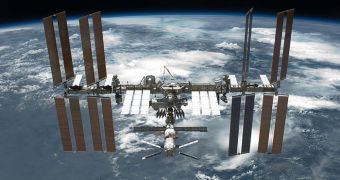Officials with the Russian Federal Space Agency (RosCosmos) announced that they finally managed to develop the organization's schedule for the next couple of months. According to the new launch manifest, a resupply flight in October will be followed by a manned mission in November.
Both these spacecraft will be bound for the International Space Station (ISS). The last resupply run that Russia tried to conduct ended in disaster when the Proton rocket carrying its Progress 44 capsule failed to reach its destination. Several tons of supplies were lost.
Since August 24, the Proton rocket has been prohibited from flying, pending the results of a future study. Experts determined that the failure was entirely accidental, and that the delivery system itself was not at fault.
Yesterday, September 13, RosCosmos officials said that they plan to launch a replacement for the Progress spacecraft in late October. Three astronauts of the Expedition 29 crew will be lifted to the ISS in November, replacing three crew members that will soon return home.
That flight will be carried out by a Soyuz rocket carrying a Soyuz space capsule. Its crew will be made up of Russian cosmonauts Anton Shkaplerov and Anatoli Ivanishin, as well as NASA astronaut Dan Burbank. All three will act as flight engineers for the first half of the new Expedition.
The Russian news service RIA Novosti reports that the new Progress freighter will most likely launch to the ISS on October 30. The need to do so is not overwhelming, experts say, and this gives authorities room to prepare for the procedure.
The space lab has supplies to last it until February, even if no more spacecraft make their way to low-Earth orbit (LEO) in the mean time. The Soyuz capsule carrying the replacement crew is tentatively scheduled to launch on November 12.
“We're working with our Russian partners on the progress of their investigation and the Progress launch failure, and we're working with them to determine when will be a good time to resume human spaceflight on the rocket Soyuz,” NASA spokesman Kelly Humphries explains, quoted by Space.
RosCosmos took the matter of the accident seriously enough, since it put a small blemish on an otherwise nearly-flawless record. Despite not featuring state-of-the-art technology, to put it mildly, the Soyuz capsules have been extremely dependent over the decades.
Over hundreds of missions, carried out since 1967, the Soyuz capsule only failed twice, in late 1967 and again in 1971, killing a total of 4 people in 44 years. The US Space Shuttle Program led to the deaths of 14 astronauts in 30 years of operations.

 14 DAY TRIAL //
14 DAY TRIAL //